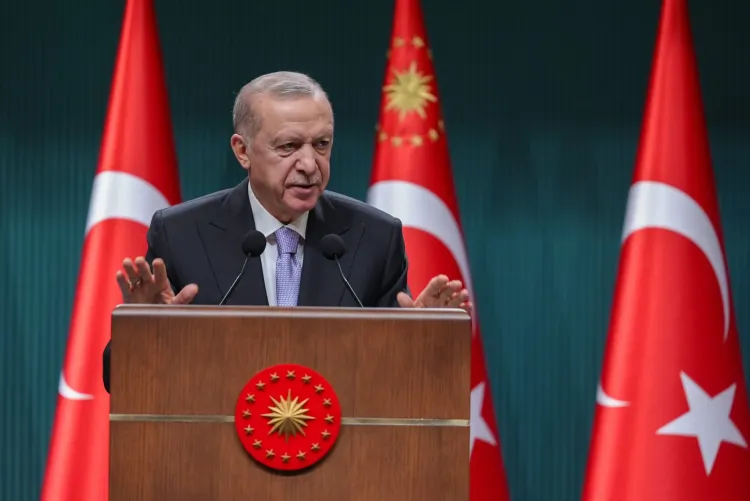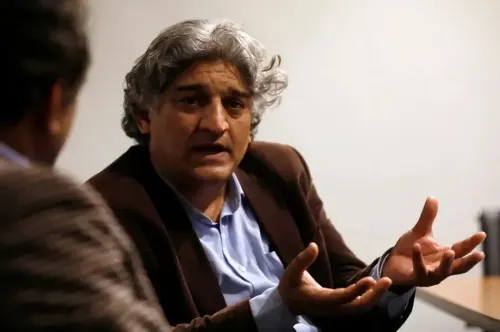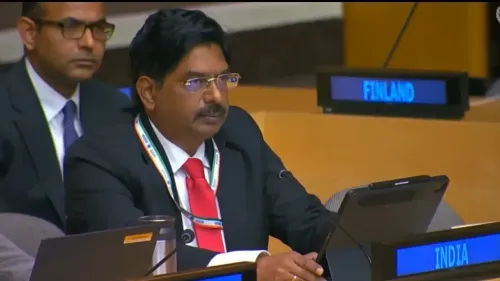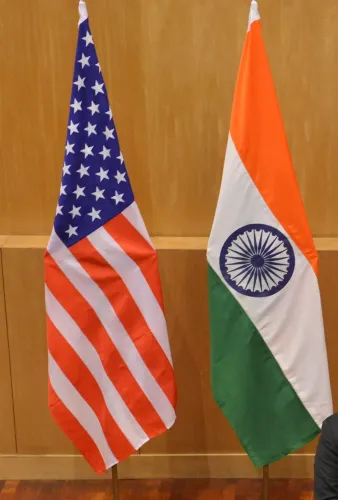Could Turkey Be the New Leader of the Muslim World?

Synopsis
Key Takeaways
- Turkey's backing for Pakistan reflects its ambitions in the Islamic world.
- Relations between Turkey and Pakistan have historical roots dating back to the Cold War.
- Turkey is challenging Saudi Arabia's traditional leadership within the Muslim community.
- The growing Turkey-Pakistan axis is extending to Bangladesh.
- India faces a new strategic challenge from Turkey's expanding influence.
New Delhi: Turkey's strong backing for Pakistan in the wake of India's retaliatory actions against terrorist organizations following the tragic deaths of civilians in Pahalgam showcases a more profound strategic ambition led by President Recep Tayyip Erdogan. This stance signifies Turkey's increasing desire to surpass Saudi Arabia as the foremost voice in the Islamic community and to broaden its influence across South and Southeast Asia, thereby challenging established alliances.
The rivalry intensified in 2019 when Malaysian Prime Minister Mahathir Mohamad organized a summit to address issues confronting the Muslim world. Saudi Arabia declined to participate and pressured other nations, including Pakistan, to do the same. In contrast, Turkish President Erdogan offered his full support to Mahathir. Riyadh perceived the summit as a threat to its religious authority and its leading role within the Organization of Islamic Cooperation (OIC).
Analysts suggested that Saudi leaders were concerned about diplomatic isolation, particularly as regional competitors such as Turkey, Iran, and Qatar were present. Pakistan's then Prime Minister Imran Khan initially intended to attend but eventually withdrew, allegedly under Saudi pressure.
Historically, Saudi Arabia has asserted its leadership over the Islamic world as the custodian of Mecca and Medina and the head of the OIC. Its global promotion of Wahhabi Islam afforded it unparalleled soft power. However, this status has shifted under Crown Prince Mohammed bin Salman’s reforms, which include limiting the powers of the religious police, enhancing entertainment options, and permitting women to drive—indicating a departure from strict orthodoxy. His Vision 2030 initiative, aimed at economic diversification and modernization, suggests a broader retreat from the exportation of religious ideology.
This changing dynamic has created opportunities for other Muslim-majority nations to assert themselves.
Turkey, under Erdogan, is poised to occupy that space. By leveraging its historical context, strategic partnerships, and ideological aspirations, Ankara is preparing for a more prominent leadership role in the Islamic world.
Turkey's quest for a distinct Islamic identity is rooted in Cold War geopolitics and nationalist interpretations of Islam. During this era, American-supported initiatives like Operation Gladio promoted a Turkish variant of Islamic Nationalism to counteract the growing leftist movements. A pivotal figure in this movement, Alparslan Turkes — the founder of the Nationalist Movement Party (MHP) and the Grey Wolves — famously asserted, "Turkishness is our body, Islam is our soul." He championed the use of Turkish over Arabic in religious texts and practices, reinforcing a nationalized version of Islam that diverged from Pan-Islamism.
Though Turkes opposed international Islamic unity, his ideas fostered a tradition where Islam served to strengthen Turkish nationalism. This synthesis laid the ideological groundwork for subsequent efforts to revive elements of the Ottoman legacy.
Under President Erdogan and the Justice and Development Party (AKP), that legacy has morphed into what some refer to as "neo-Ottomanism." Erdogan refrains from framing his agenda as pan-Islamic but instead positions Turkey as the logical successor to Ottoman leadership within the Muslim community. His focus on Muslim unity—especially with marginalized groups—blends humanitarian ideals with strategic intentions. This dual approach is evident in Turkey's involvement in conflicts such as Syria, Libya, the Caucasus, and more recently, South Asia.
Erdogan is among the few global leaders to have addressed the Pakistani parliament, emphasizing the strength of their bilateral relationship. His address, filled with prayers for lasting unity, was more than mere symbolism; Turkey and Pakistan share a rich history of strategic and ideological cooperation.
Their collaboration dates back to the early Cold War. In 1954, they signed a Treaty of Friendship and became part of Western-led alliances like CENTO and SEATO. While India chose a non-aligned stance, Pakistan opted to align with the US bloc. As a NATO member, Turkey found common interests with Pakistan in opposing communism and their strategic geographical locations. Cultural and ideological connections followed, with Turkish Islamists admiring influential Pakistani thinkers like Abul A'la Maududi and Muhammad Iqbal. During the Soviet invasion of Afghanistan, Turkish and Pakistani intelligence quietly coordinated support for the Mujahideen, backed by the US and Gulf states. What began as Cold War collaboration has since evolved into enduring Islamic solidarity.
Turkey is currently the second-largest supplier of arms to Pakistan, providing advanced drones, naval systems, and aiding the modernization of Pakistan's military. Turkish-made drones like the Bayraktar TB2 have reportedly been utilized by Pakistan in sensitive operations along its border with India.
Beyond military collaboration, the two nations have formalized their partnership through the High-Level Strategic Cooperation Council, which oversees joint efforts in defense, trade, culture, and education. Trade agreements and investment collaborations are on the rise, with a mutual aim of achieving $5 billion in bilateral trade. Both countries also coordinate on international platforms, advocating for the Muslim community on issues such as Islamophobia and Kashmir. Turkey has consistently backed Pakistan’s stance on Kashmir at the United Nations and other diplomatic forums.
The personal relationship between Erdogan and successive Pakistani leaders adds an additional layer of significance to this partnership. Frequent visits, public demonstrations of solidarity, and mutual commendations serve to bolster the perception of a close and lasting alliance.
The informal yet influential connection between Turkish and Pakistani Islamist movements adds another dimension to their relationship. Turkish Islamists view themselves as part of a larger Islamic renaissance, drawing intellectual stimuli from Pakistan’s religious scholars. Even during Turkey’s secular phase, conservative networks maintained discreet relationships with their Pakistani counterparts. These connections were strengthened through shared participation in causes like the Afghan jihad.
In the aftermath of 9/11, with the global political landscape shifting, Turkey repositioned itself as a mediator between Islamic values and modern governance. Erdogan seized this opportunity to present Turkey as a model Islamic democracy while simultaneously reactivating conservative Islamic networks both domestically and internationally.
This ideological kinship extends beyond mere rhetoric. Turkish NGOs and educational institutions have found a welcoming environment in Pakistan, especially through religious schools and social initiatives. These endeavors foster long-term cultural and ideological alignment.
The emerging Turkey-Pakistan alliance is now expanding to include Bangladesh, indicating a wider realignment within South Asia. In January 2025, a Turkish delegation visited Dhaka, shortly after Pakistan and Bangladesh agreed to conduct joint naval exercises—their first significant military cooperation since the 1971 war. For the first time since gaining independence, Pakistani troops are operating on Bangladeshi territory, raising alarms in New Delhi.
Further heightening concerns is the increasing presence of Turkish-backed NGOs in Bangladesh. One organization, Saltanat-e-Bangla, reportedly associated with Ankara’s religious soft power initiative, promotes a revisionist vision of a "Greater Bangladesh" that encompasses parts of India and Myanmar. Although such narratives remain fringe, they can gain traction amidst unstable political conditions.
For India, which is already wary of Chinese influence, Turkey’s growing presence poses a new strategic dilemma.
Turkey’s strengthening relationships with Pakistan and Bangladesh extend beyond cultural or religious ties. They reflect a deliberate strategy to establish Ankara as a leading power within the Islamic world, challenging the historical dominance of Gulf nations like Saudi Arabia and the UAE. By leveraging historical connections, ideological alignments, and strategic partnerships, Turkey seeks to reaffirm its status as both a regional and religious authority.
The realignment remains dynamic, and its course will depend on the reactions of other key stakeholders—India, Iran, Saudi Arabia, and China. However, the trend is unmistakable: Turkey is no longer a peripheral player in South Asia's Muslim politics. It is now actively influencing the region's alliances and geopolitical narrative.
(The writer is an academic based in New Delhi with expertise in Southeast Asia and Islam. He has taught in countries such as Japan, the USA, Russia, and Malaysia. The views expressed are personal.)









